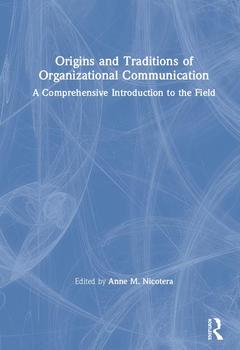Origins and Traditions of Organizational Communication A Comprehensive Introduction to the Field
Coordonnateur : Nicotera Anne M.

Origins and Traditions of Organizational Communication provides a sophisticated overview of the fundamentals of organizational communication as a field of study, examining the field?s foundations and providing an assessment of the field to date, explaining and demonstrating a communicational approach to the study of organization.
It provides a set of literature reviews on focused topics written by experts in each area, and links organizational communication theory and research to practice. In reviewing foundational management theory, the book analyzes how early to mid-20th-century management theories shaped contemporary organizations, providing students both with background knowledge of these foundational theories and an understanding of their influence on our thinking and our organizational world.
Written at an accessible level for early graduate students, yet still sophisticated enough for doctoral students, the book is ideal for students and teachers of organizational communication and communication history.
Downloadable ancillary materials include chapter PowerPoints and a set of instructors' materials containing chapter abstracts, glossaries, discussion questions, annotated supplementary readings lists, and practitioners' corners. Please visit www.routledge.com/9781138570313.
Part I: Organizational Communication History 1. Organizing the Study of Organizational Communication 2. Developments in the 20th Century 3. Developments in the 21st Century 4. Paradigms: Ways of Knowing in Organizational Communication Part II: Foundational Organizational Theory 5. Classical Management Theory 6. Human Relations Theory 7. Human Resource Management Theory Part III: Topics in Theory and Research 8. Socialization 9. Communication Networks 10. Workplace Relationships 11. Identity and Identification 12. Power and Resistance 13. Gender and Feminist Theory 14. Difference and Intersectionality 15. Groups, Teams, and Decision Making 16. Conflict 17. A Communicative Approach to Leadership 18. The Structuration of Emotion 19. Technology and Organizational Communication 20. Globalization and Organizational Communication 21. Organizational Change
Anne M. Nicotera is Professor and Chair in the Department of Communication at George Mason University and an organizational communication consultant. Her research is grounded in a constitutive perspective. She has published six books and numerous articles in outlets such as Management Communication Quarterly, Journal of Applied Communication Research, and Health Communication.
Date de parution : 06-2019
17.8x25.4 cm
Date de parution : 06-2019
17.8x25.4 cm
Thèmes d’Origins and Traditions of Organizational Communication :
Mots-clés :
Channel Expansion Theory; organizational communication; SCT; group communication; Leader Member Exchange Theory; organizational conflict; Vice Versa; maangement theory; High Quality LMX Relationship; human relations theory; Emotional Exhaustion; Organizational Democracy; CCO; Organizational Communication Scholarship; Information Peers; Organizational Communication Research; Organizational Communication Phenomena; Workplace Friendship; International Communication Association; HRM Ideal; AST; Organizational Communication Literature; Classical Management Theory; Organizational Communication Studies; Workplace Bullying; Concertive Control; Early Management Theory; Leader Member Relationships; SCT; Supervisor Subordinate Relationships; Feminist Organizational Communication



